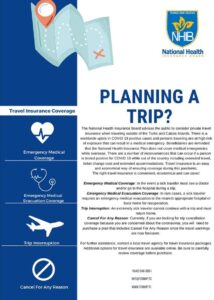Dana Malcolm
Staff Writer
#TurksandCaicos, May 20, 2024 – Health numbers in the Turks and Caicos are showing a concerning increase in lifestyle diseases according to recent statistics shared by Dr. Camelia Clarke, Director of Health Promotion and Advocacy Unit, who detailed the concerns recorded by the Ministry of Health.
”In 2021– we found that 19 percent of the population was hypertensive and a significant chunk was the 55 and up age group, we are an aging population. We are victims of our success. We’ve done well in terms of communicable diseases and we are living longer, but we are getting sicker as we become older,” the director explained at the launch of the National Healthcare Sector Strategic Plan on May 14.
Globally NCDs are separated into five categories, Mental Health, Cardiovascular Diseases, Chronic Respiratory Diseases, Cancers, and Diabetes and when they occur its bad for everyone.
“There’s a heavy, economic burden, not just on individuals, but families, communities and health systems in general. While NCDs present in different ways there are five common underlying risk factors; physical inactivity, unhealthy diet,  immoderate use of alcohol, tobacco use and poor air quality,” Clarke revealed.
immoderate use of alcohol, tobacco use and poor air quality,” Clarke revealed.
These five factors and the resulting five categories of diseases account for over 70 percent of deaths worldwide, the Director explained, citing that 15 million of the 41 million people who die each year, are part of the working age group which she described as ‘a significant economic knock’.
The breakdown of the Turks and Caicos’ illnesses in 2021 via phone survey, found that of the 19 percent of hypertensive residents locally, 41 percent were 55 and over, 19 percent were 35 to 54 and 9 percent were between 18 and 34 years old. Additionally 7 percent of the overall population was found to be diabetic.
Between 2015 to 2019, the number one cause of death was drowning owing to freak accidents where migrant boats capsized, but next to that was NCDs which were responsible for about half of all the deaths recorded during the period with cardiovascular diseases being particularly deadly.
Instances of Breast Cancer in the Turks and Caicos were also described as ‘significantly high’ along with a notable increase in overall cancer diagnoses locally. Between 2010 and 2013 diagnoses were more than six times higher according to the TCI Hospital.
In addition to that came a significant increase in deaths, and in the Turks and Caicos between 2021 and 2023 over $2 million was spent treating cancers, and over $300,000 on cardiovascular diseases just for overseas treatment.
Children in the Turks and Caicos are at risk as well, Clarke cited a 2015 study that showed primary school age children were experiencing risks associated with diet and physical activity.
”We also found that, unacceptably, out of every 10 children, four of them were considered overweight or obese— compounding that we found that they were taking less fruits and vegetables than we wanted them to and not exercising as much as we want. The future is looking kind of bleak,” Clarke admitted.
To stave off that future the National Healthcare Sector Strategic Plan has goals such as increased health promotion, removal of barriers to early detection of NCDs, decreased mortality, and more data.
Clarke maintained that by setting ambitious goals like those included in the National Healthcare Sector Strategic Plan the country could slowly but surely decrease the concerning numbers.

